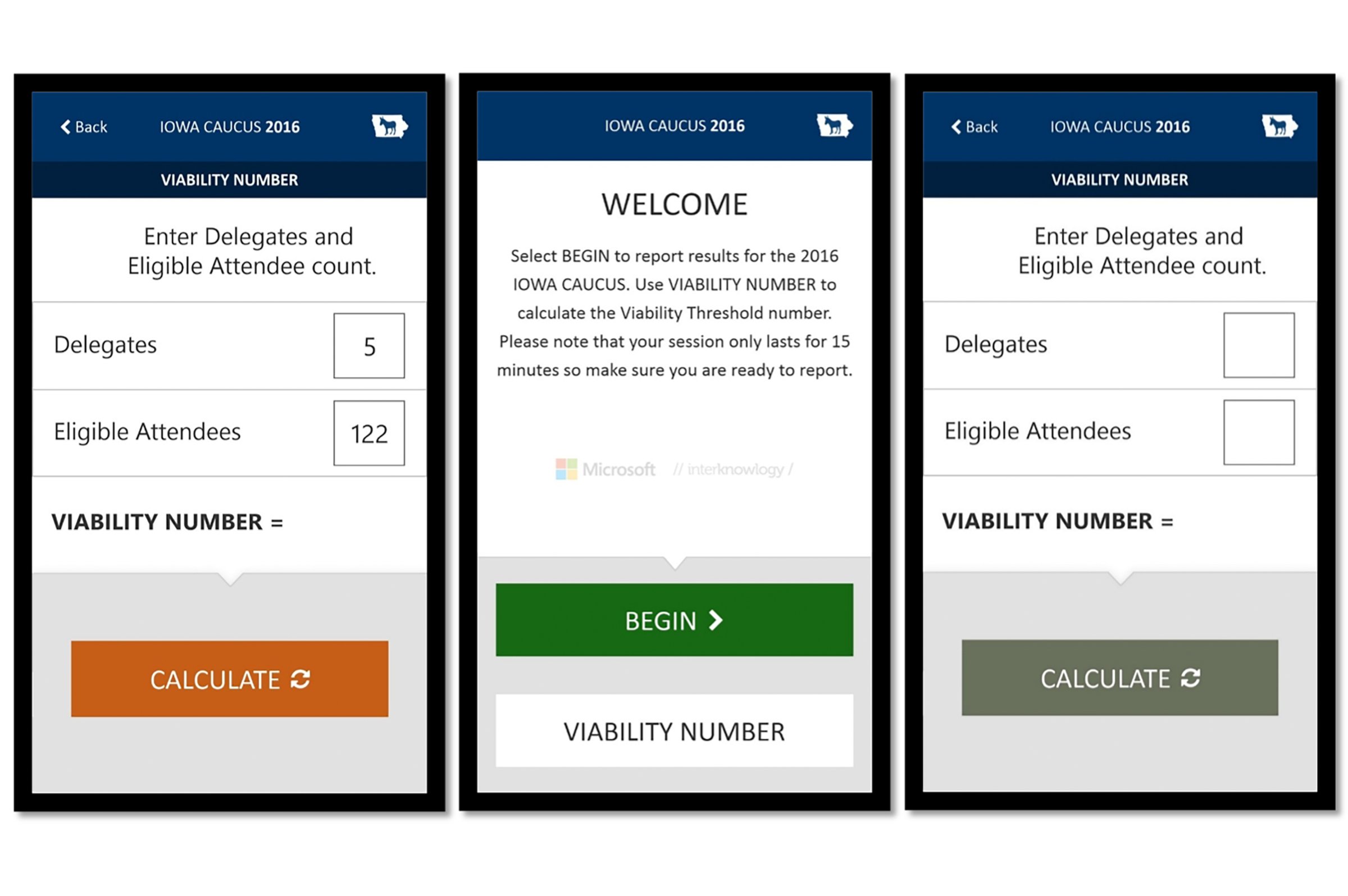
In 2012, the system behind the Iowa Republican caucuses broke down. Missing votes and miscounts led to a two-week period when the winner was in doubt, hurting the campaign of former Pennsylvania Sen. Rick Santorum, who narrowly won.
Aware that another embarrassment could cost the state its first-in-the-nation status, the Iowa Republican and Democratic parties joined forces with Microsoft to replace the old telephone-based reporting system with a digital one.
Now that system is facing scrutiny as well. On Wednesday, MSNBC reported that some aides in Vermont Sen. Bernie Sanders’ campaign are worried that Microsoft’s corporate influence will sway the caucus results on its custom app.
To be fair to the designers of the new system, which was demonstrated to TIME in December, the complaints amount to little more than a general suspicion of corporate interests. So far, there’s no evidence of any problems with the system or any particular reason to doubt Microsoft’s intentions.
“Why would a company like that give it away for free?” asked Pete D’Allesandro, who is running the Sanders’ campaign in Iowa. “The point there is they’re testing it. If they’re testing, we better damn well make sure we have something to back it up.”
But Microsoft, which is locked in pitched battles with Google and Amazon, does have a reason to give something like this away for free and make sure it works. Helping solve a problem like the Iowa caucuses is great publicity for its business-oriented services, especially with its current push to help users be productive regardless of the hardware they’re using.
If anything, Microsoft has something to lose, since it will take the fall if there are any technical problems.
Sam Lau, a spokesman for the Iowa Democratic Party, said the app has been in development for more than a year.
“Microsoft and their App partner, InterKnowlogy, are global leaders in the technology industry, and we completely trust the integrity of their staff and the app,” he said. “The app will help make caucus reporting more efficient, accurate and secure, and we look forward to seeing it in action on caucus night.”
In a statement, Microsoft said it is “proud” to be working on the event.
“The Iowa Caucuses provided a unique, non-partisan opportunity to use technology to help evolve the reporting process,” it said. “Microsoft is providing technology and services solely to administer and facilitate a neutral, accurate, efficient reporting system for the caucuses.”
Here’s how the system will work:
Microsoft and its technology partners built two parallel systems, one for each caucus, customized to the particulars of each process. Republicans, for instance, will report raw vote totals. Democrats have a viability threshold that may require some caucus-goers to shift their support at the caucuses, and their system will only report delegate totals.
The Democratic app also includes a calculator to determine the viability threshold, which depends on the number of delegates each precinct has and the number of attendees at the caucus. This system is far more intuitive than the old process, which required caucus chairs to do the math by hand.
On caucus night, precinct chairs or designated reporters will log into a free app on their iPhone, Android, or Microsoft devices and log in with secure credentials obtained from each state party. The login window is only 15 minutes long, designed to minimize the chance of erroneous or malicious efforts.
At each precinct location, representatives of the campaigns will be able to view the inputs reported in, which will be instantly transmitted back to the state party temporary headquarters at a downtown Des Moines building. There, party officials and campaign representatives will be able to review the numbers once again—while Microsoft is allowing the state parties to add automatic flags to spot obviously false data, such as precincts reporting vote totals far above historical norms. Only once the party and campaigns sign off will the numbers be released publicly—and even then only after a short delay to allow them to be recalled should a last-minute error be spotted
The biggest vulnerability—human error—is lessened or at worst equal to the old system, Microsoft and party officials say. The vote-reporting system won’t allow reporters to submit incomplete caucus returns, as had been the case in previous years, requiring totals to equal 100%, for instance. And unlike the phone system, reporters will be presented with a confirmation page to double-check their results. (The phone system will be available as a backup should there be any issues with the Microsoft system.)
Republicans have successfully tested the system in all 1,681 precincts in the state, but Democrats have fallen short. Over the weekend, the Iowa Democratic Party did not dispute sources who told TIME that it is short over 200 temporary precinct chairs, and it has not conducted the same level of training and testing as the Republican Party.
With Sam Frizell
More Must-Reads From TIME
- The 100 Most Influential People of 2024
- The Revolution of Yulia Navalnaya
- 6 Compliments That Land Every Time
- What's the Deal With the Bitcoin Halving?
- If You're Dating Right Now , You're Brave: Column
- The AI That Could Heal a Divided Internet
- Fallout Is a Brilliant Model for the Future of Video Game Adaptations
- Want Weekly Recs on What to Watch, Read, and More? Sign Up for Worth Your Time
Contact us at letters@time.com